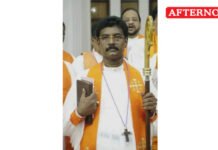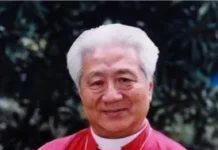About 600 Christian leaders from across Asia gathered in Thailand to “rethink church and mission” in mid-October.
From October 17 to 21, Christians from more than 40 countries attended the Asia 2022 Congress conducted in Bangkok under the theme of “Rethinking Church and Mission: God’s Agenda for Today”.
The week conference was jointly hosted by Asia Lausanne, Asia Theological Association, and Asia Evangelical Alliance.
In the opening ceremony, Rev. David Ro, chair of the Asia 2022 Congress and Regional Director East Asia of the Lausanne Movement, shared three reasons for the congress. “We are going to come together to celebrate and mark in church history God’s work in Asia. We are acknowledging the rise of the Asian church throughout all these years.” He also mentioned the transitional shift of global Christianity from the West to the rest that God’s work is scattered in Latin America, Africa, and also the Middle East. “The church is moving into a different type of funique contextualization, which requires us to have different ways of thinking, theologizing and practices to adapt to the new realities of global Christianity.”
The third reason was that fast-growing churches in Asia have stepped on the path of missions, begun by the Korean church which has sent 25,000 missionaries to the world and followed by other countries to reach the unreached.
At the end of his welcome address, Rev. Ro invited every nation to bring three young people who are willing to pay the price to preach the gospel to the unreached groups next year for the Asia 2023 Congress which will take place in Pattaya, Thailand, from July 25 to 29. The congress will gather two or three thousand young people aged from 18 to 30 for the global mission.
During the week, more than 30 speakers contributed to five Bible expositions centered around John 15:9-17, seven plenaries addressing key issues, and 15 seminars. Every day there was also worship and prayers. Particularly, a session on the partnership of Asian churches with the world church was conducted simultaneously with seven different continents or regions.
In a plenary speech, Dr. Yoshiyuki Nishioka, research director at the Tokyo Mission Research Institute, contrasted the current two types of gospel transmission— the propositional approach and social service approach, and presented the new approach, witnessing in the Asian context.
Joseph Liow, Tan Kah Kee Chair in Comparative and International Politics at Nanyang Technological University (NTU), Singapore, shared his insights on the church-and-state relationship in Asia today. Liow highlighted the emphasis on living in non-Christian countries as Christians and suggested believers avoid extreme actions toward social injustices.
Other topics covered discipleship, recovering the supernatural, persecution, the young generation in collaboration with the older, theology education and pastoral training, technology, mission experiences from other countries, and Asian culture.
The participants gathered in roundtables where eight to ten people sat each and they worshipped, prayed, and discussed issues together at each table.
In the closing ceremony, David Sung Eun Choi, senior pastor of Global Mission Church, preached a sermon titled “Three Characteristics of the Gospel” (inclusiveness, exclusiveness, and to be proclaimed in terms of God’s commands), encouraging the listeners to share the powerful gospel with others. Afterward, seven representatives from different countries announced the liturgical prayer of unity in Chinese, Arabic, Hindi, Bahasa Indonesia, Thai, Nepali, and Japanese in turns. The participants received bread and wine in the holy communion together.



